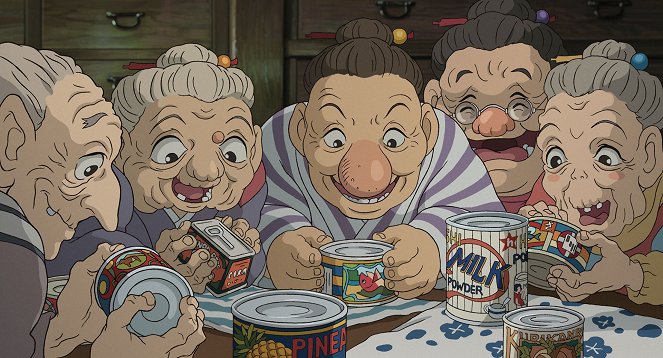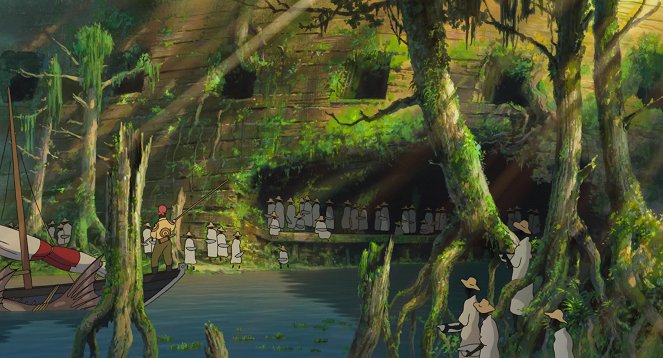Director:
Hayao MiyazakiGuión:
Hayao MiyazakiCámara:
Atsushi OkuiMúsica:
Joe HisaishiReparto:
Soma Santoki, Takuya Kimura, Jun Fubuki, Jun Kunimura, 小林薫, Karen Takizawa, Keiko Takeshita, Kō Shibasaki, 菅田将暉, Sawako Agawa, Shinobu Otake, Shôhei Hino (más)Sinopsis(1)
Un joven llamado Mahito, que añora a su madre, se aventura en un mundo compartido por los vivos y los muertos. Allí, la muerte llega a su fin y la vida encuentra un nuevo comienzo. (Vértigo Films Esp.)
Videos (7)
Reseñas (6)
Ya sobre El viento se levanta se decía que probablemente sería la última película de Miyazaki, y no fue así. El chico y la garza tampoco tiene por qué ser el punto final, pero sí se siente en ella un poco como una recapitulación del autor, una mirada retrospectiva a su propio trabajo y, al final, el paso del cetro a una generación más joven, que también está presente en la historia. En cualquier caso, el maestro de la animación y la narración cinematográfica no ha cejado en la cantidad de ideas, la variedad de sus visiones y la profundidad de las ideas presentadas, su película luce hermosa y desborda elementos mágicos, de cuento de hadas y oníricos, que a veces pueden ser crueles y a veces tiernos. La introducción sigue siendo civilizada y prácticamente sin elementos sobrenaturales, pero tan pronto como la garza titular muestra los dientes, comienza a hablar con voz humana y el personaje principal (lamentablemente no muy interesante) cae en un mundo de fantasía, durante el cual tiene que lidiar con la pérdida de su madre y los sentimientos de dolor, soledad, ira y tristeza, la imaginación y la alegría de Miyazaki se activan al máximo. El esfuerzo por conseguir decir todo lo posible en dos horas lleva a que en algunos partes la película esté muy cargada y no deje terminar debidamente algunas escenas. Al mismo tiempo, Miyazaki regresa a sus esquemas argumentales probados (basándose principalmente en su El viaje de Chihiro) y a sus frecuentes marcas registradas. La película es casi un catálogo de todo lo que se puede asociar con las películas de Miyazaki, pero no alcanza el nivel de sus mejores películas.
()
Esto no es lo mío. Puedo apreciar la animación verdaderamente admirable y la construcción imaginativa del mundo, pero mentiría si dijera que estoy satisfecho como espectador. El protagonista unidimensional y taciturno es un vínculo aburrido y poco interesante entre los numerosos paisajes oníricos fantásticos de Hayao Miyazaki. Emocionalmente no me cautivó en absoluto y, especialmente en el último tercio, lo encontré bastante agobiante. No soy fan, lo siento. [Sitges 2023]
()
The older Miyazaki gets, the less literal and linear his work becomes, the less regard he has for classic narrative concepts and the more he makes films solely for himself without any regard for others. And thanks to that, each of his new works that we have the good fortune to see for the first time is that much more fascinating and unique. So, it is time that we stop recounting which elements and motifs that his latest film has in common with those that came before. The most beautiful thing about Miyazaki’s films has always been that rare opportunity to forget about everything that we are accustomed to in run-of-the-mill audio-visual media and to let ourselves be carried away by the creator’s unique vision. Not only does one limit the degree of amazement by relating this film to the master’s previous work, but doing so also diminishes the distinctiveness of the film itself, which requires an open mind. Let’s also acknowledge that the title, The Boy and the Heron, originated as a meaningless placeholder in the heads of international distributors, who didn’t know what to make of the original title, which didn’t fit into any established categories. Let’s thus call the film by its real name: “How Do You Live?”. The original title pays tribute to the book of the same name, which was essential for the adolescent Miyazaki and even appears in the film. However, the filmmaker did not adapt it, rather only using its title as an allusion, as well as for a semantic framework for not only his new film, but for his overall work. Just as the concept of time fades away in the narrative and the elderly characters appear in their youthful form and the generations of a single family can come together at the same time, Miyazaki uses the question in the original title of his film to speak both to himself and to us about his own past and present. In his latest work, the filmmaker, who has devoted his entire productive life (which, in the case of the workaholic octogenarian, means to this day), uses another such narrative to give us an expressive look into the inner life of a young man buffeted by trauma, loss and apprehension about the life that lies ahead of him. In that inner self, new worlds that simultaneously exude uplifting boisterousness and the weight of inevitability are created using the basic building blocks of reality and fantasy, cemented together with emotions. Together with the titular question of how we will live in the face of an oppressive world, Miyazaki shows us through his protagonist how he himself coped with growing up in the shadow of war and the death of his beloved mother. Using the words of today’s audio-visual media, we could say that Miyazaki’s new film is the magnificent peak of his filmography (so far), as well as a meaningful prequel to it. In this film, Miyazaki presents to us the duality of beauty and terror, love and anger, and simply life and death, as he has done throughout his career so far. Each new Miyazaki film is like a half-read book left in the middle of a shelf by a missing uncle who went mad from reading countless books. Those films’ renown precedes them and evokes in us a feeling of awe at being in contact with something that will inevitably go beyond us, as well as foolish concern as to whether the films will live up to expectations. Therefore, we approach them only cautiously and sometimes, to our own detriment, we refuse to give in to them. But it is enough to break through the first wave on the horizon and let it wash away all doubts, and then just peacefully sail with an open mind aboard the narrative, which is held securely in the hands of the greatest master of cinema. And yes, again, it is a journey that overwhelms us with imagination many times, but it is also a journey from which we will always have memories of those peaceful moments when we realise that we are suddenly as calm and collected as the characters that we are watching. There is nothing more precious, more terrifying, more beautiful, more agonising, more turbulent or more comforting than each new Miyazaki film.
()
(menos)
(más)
Wonderful! Miyazaki's graciously poetic mind has conjured up a fantasy fairytale fable from post-war Japan, a bit in the style of Pan's Labyrinth. It is perhaps impossible to watch except with a permanent smile and the occasional tear in the eye. The animation is breathtaking and, in comparison, the Pixar, Disney and Sony trailers that preceded it are truly pathetic. It's not that I don't like CGI animation, but The Boy and the Heron simply took my breath away, something that didn’t happen (yet) when watching those other films.
()
I'm a fan of Mr. Miyazaki's work. There was a time when I absolutely loved all his creations and had to watch one of his films at least once a year. From 2009 to 2012, I went to great lengths to track down his short films, even those exclusive to the Ghibli Museum in Mitaka. I adore his animation style, storytelling prowess, and the profound messages woven into his films, not to mention the delightful humor. But what truly captured my heart was his unparalleled imagination, which always felt uniquely beautiful to me. Naturally, I couldn't pass up the opportunity to watch another "last" film by Mr. Miyazaki. It delivered exactly what I anticipated. The animation was mesmerizing, the music underscored the best moments beautifully, and the fantasy world depicted was as enchanting as ever. The humor landed well too, with its cute jokes and light situational comedy eliciting smiles at just the right moments. The story intrigued me, and I appreciated its thematic depth. However, there was a minor hiccup. While the relationship between the boy and the heron resonated with me and unfolded organically, I found the portrayal of the boy's family dynamics, particularly his evolving relationship with his stepmother, less convincing. The abrupt character transformation felt jarring, leaving me somewhat detached during a pivotal moment. Consequently, the film's overall impact fell short of truly moving me. Upon leaving the cinema, I couldn't shake the feeling that I'd witnessed something great but not quite unforgettable, something that wouldn't occupy my thoughts for hours on end. In summary, The Boy and the Heron earns an 8/10 from me. It largely met my expectations for another Miyazaki production, but it didn't quite reach the pinnacle of his filmography. It's unlikely to be the first, second, or even third film that springs to mind when I think of Hayao Miyazaki.
()
Galería (32)
Foto © TOHO Company / Studio Ghibli



Anuncio